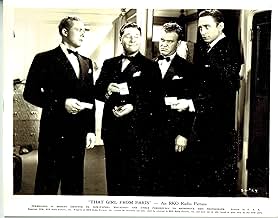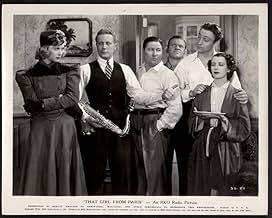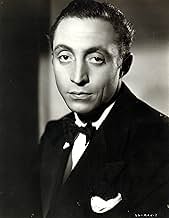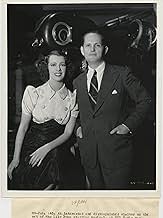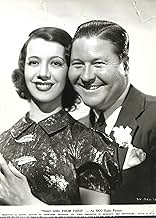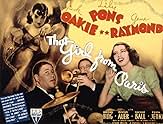Nikki Martin (Lily Pons), a Parisian opera star, takes off in search of adventure and true-love, leaving her arranged husband to be at the altar. While hitchhiking, Nikki meets handsome Amer... Read allNikki Martin (Lily Pons), a Parisian opera star, takes off in search of adventure and true-love, leaving her arranged husband to be at the altar. While hitchhiking, Nikki meets handsome American musician, Windy McLean (Gene Raymond) and his band, the 'McLean Wildcats.' Windy imme... Read allNikki Martin (Lily Pons), a Parisian opera star, takes off in search of adventure and true-love, leaving her arranged husband to be at the altar. While hitchhiking, Nikki meets handsome American musician, Windy McLean (Gene Raymond) and his band, the 'McLean Wildcats.' Windy immediately spites her, but Nikki falls in love with him and follows him to New York by stowin... Read all
- Nominated for 1 Oscar
- 4 wins & 1 nomination total
- Judge at 2nd Wedding
- (uncredited)
- Undermined Secondary Role
- (uncredited)
- Wedding Guest
- (uncredited)
- Undetermined Secondary Role
- (uncredited)
- Wedding Guest
- (uncredited)
- M. Picard
- (uncredited)
- Justice of the Peace
- (uncredited)
- Doorman
- (uncredited)
- Ship's Purser
- (uncredited)
- Hammacher's Band Member
- (uncredited)
- Paul Joseph DeVry
- (uncredited)
Featured reviews
She gives a fine performance both acting and singing. The plot is typical 1930s fare, and I thought it amusing and better than average. I find Pons's characterization very charming.
As for Pons being tall and willowy, the lady was a petite 5 feet tall (see IMDb bio), but she sure had a superior voice in that little body. The "pop" tunes she was given to sing in this film were written with an operatic voice in mind, requiring a large range to sing.
No other mention has been given to Lucille Ball's very, very funny comedic dance. Her character is sabotaged with a pair of soaped-up dancing shoes, causing her to slip and fall every time she tries to dance. I've watched this over and over and I laugh out loud every time I see it. It takes a very good, well-trained dancer to be able to fall down as much and as well as she did.
I enjoy Pons' operatic recordings, and have most of them, but she doesn't work well in this movie. She had neither the personality nor - to be honest - the looks of Jeannette MacDonald or Grace Moore, and at this point she was still having real problems with the English language. A comedy with a lead who isn't good with the language is a real problem. Contrast her with Herman Bing, who misused English to comic effect, and you see the difference. She was no dancer, at least in this movie, either. Her one real talent, that for which she was famous at the Met, was her high notes.
That causes problems in a movie made for a general audience. She is too often given music to show off her very high notes and her staccati. At the Met audiences appreciate that sort of thing, but it seems misplaced in what was meant to be a general audience movie. She should have been given more lyrical music, less fireworks. Think of Jeannette MacDonald singing "San Francisco" in the movie of the same name, which came out the year before, or Grace Moore singing "Ciriciribin" - much less "Minnie the Moocher" - and you see how such a soprano could have handled pop music effectively. Pons just doesn't seem at ease with it.
It's interesting to see how she performs "Una voce poco fa" in her Met Opera scene. If that's how she did the role on stage, she was not much of an actress even by the operatic standards of her day. She tilts her head to the music, and opens and closes her fan. That's about all there is to it. If you recall Risë Stevens doing the Habanera from Carmen in *Going My Way* you can see that more could have been done to make the scene interesting - if Pons had been willing.
This movie could also have used a better director, to make the comedy scenes even better, or perhaps to have helped Pons do a better job. I suppose RKO was not going to assign one of its better directors to this.
But the basic problem is that Pons was not movie material, at least not for this sort of general audience comedy. She doesn't sink the picture, but she doesn't add anything positive to it, either. On this latest watching, I do really feel that she messed up what could have been a fine film.
Footnote: The year after making this picture, the male lead, Gene Raymond, would marry Jeannette MacDonald, another lyric coloratura who was much better suited to the movies, and much better presented there.
Not liking the arranged marriage she's been hammerlocked into Lily hooks up with a touring swing band consisting of Gene Raymond, Mischa Auer, Frank Jenks, and Jack Oakie. Of course all that doesn't sit well with Lucille Ball, affianced to Raymond and getting some of the best lines in the film.
Pons has some good numbers in all genres of music including a swing version of the Blue Danube Waltz and highlighting with her character's Metropolitan Opera debut in the Barber Of Seville.
This film was made right after Grace Moore scored such a success in One Night Of Love for Columbia Pictures. Studios went out and signed up opera singers, Lily Pons was RKO's catch. The vogue came and went quickly, this was Lily's second feature film after I Dream Too Much. She would do one more Hitting A New High and then she would return to the Metropolitan Opera for real.
But I'm glad some of these voices like Lily Pons recorded their art for posterity in films like That Girl From Paris.
Did you know
- TriviaIn the beginning of the film, Pons' character escapes her wedding in a non-supercharged 1936 Cord 810 convertible coupe. The Indiana-made car, which cost about $3,700 was rare even when new and exotic enough to look like it belonged in the movie which begins set in France. In just "good" condition in 2021, an example of this car is worth well over $100,000.
- GoofsWhen Windy's car suffers a second tire blow-out, the left rear tire is shown going flat again in close-up. But when Windy and Nikki exit the car, the left rear tire is not flat.
- Quotes
Whammo Lonsdale: [three musicians, in jail for aiding a foreigner's entrance in the country to help her singing career, are reading about her marriage in the newspaper] And to think, she started wid' us. We give her her first break.
Laughing Boy Frank: And now, we're takin' the rap for it.
Whammo Lonsdale: Yeah, she's been playin' us for suckers all along. She's been engaged for six months.
Butch: [in typical form, Butch always resorts to his unconventional political views] And to a financier, which proves that at heart, all women are capitalists.
- ConnectionsReferenced in Shirobara wa sakedo (1937)
- SoundtracksBridal Chorus (Here Comes the Bride)
(1850) (uncredited)
from "Lohengrin"
Music by Richard Wagner
Played at the first wedding
Reprised at the second wedding
Details
Box office
- Budget
- $534,000 (estimated)
- Runtime1 hour 44 minutes
- Color
- Aspect ratio
- 1.37 : 1
Contribute to this page


